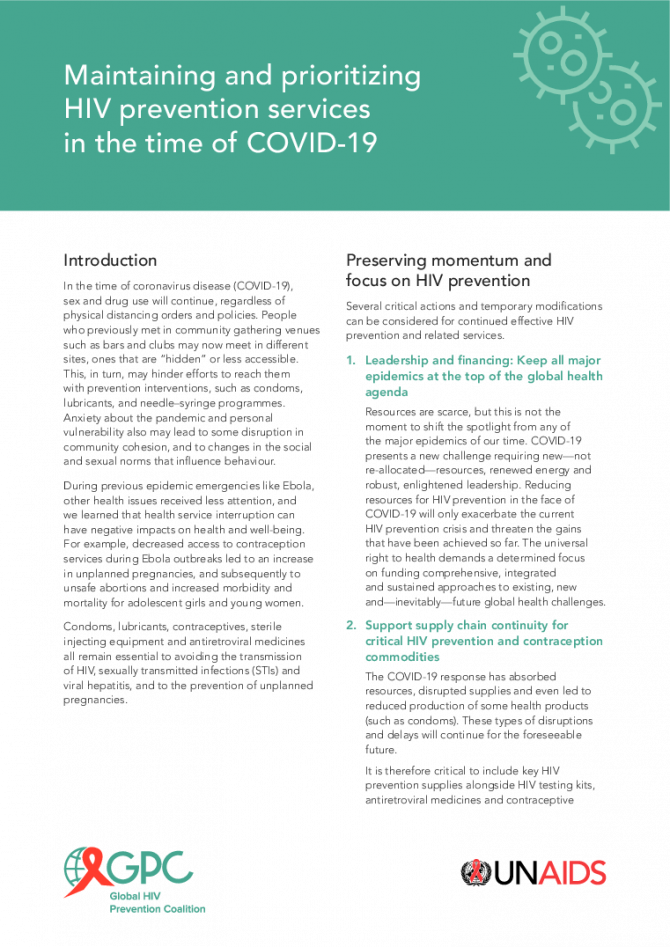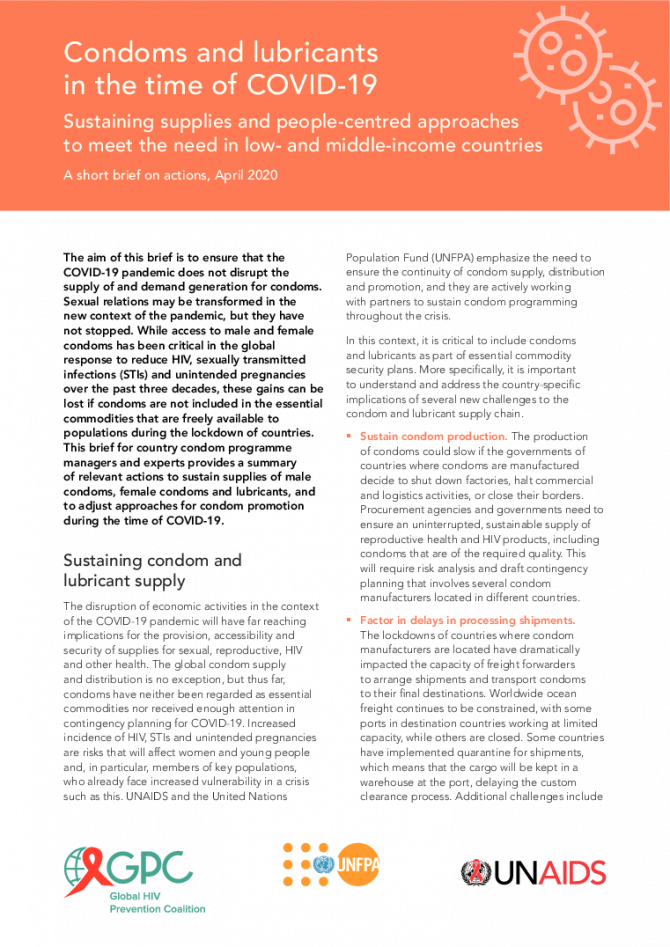
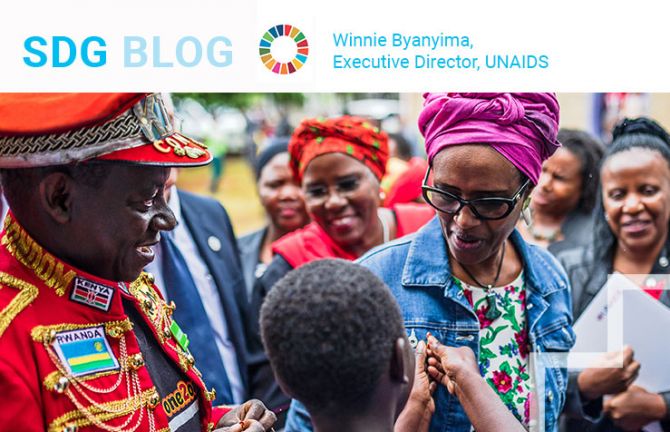
Opinion
We must act together to beat COVID-19 in Africa
03 May 2020
03 May 2020 03 May 2020The COVID-19 outbreak has been placing unprecedented strains on sophisticated health systems in Europe and Asia, with overstretched medical staff struggling to treat their patients and intensive care facilities overwhelmed in rich countries. With cases rising in Africa, concerns are increasing on the impact on fragile health systems there. This crisis is already exposing glaring inequalities between the rich and the poor in the developed world, and it is about to reflect even greater inequalities between the North and the South.
This health crisis, like others, is hitting the poorest and the most vulnerable the hardest, especially in Africa. What does social distancing mean in Africa’s congested townships, its packed markets and buses. How will people wash their hands several times a day to protect themselves from the virus without having access to water and basic sanitation? And what does that mean for women and girls who bear the daily burden of hauling water from rivers and wells for their households? How will a mother choose between going to work to put food on the table or staying at home with a cough or a fever? How do we tell informal workers, taxi drivers and all those who operate in the platform economy and live hand-to-mouth not to go to work?
We need to act now! There are four things we must do urgently: scale up testing and isolate infected people and communities, invest in health and protect our healthcare workers, focus on the community to ensure that the community response is strong, and have a constant supply chain.
The Africa Centre for Disease Control and Prevention estimates that 10 million testing kits will be necessary to respond to COVID-19 effectively over the next three months. Hundreds of millions of personal protective items such as face masks, protective gowns and gloves will also be needed. At a time when there is a global demand for these medical supplies, Africa must not be left behind. As we have seen in other countries, the best way to reduce infections and deaths is to test, treat and isolate infected people and communities to contain the virus. So, the supply of testing equipment and access to testing must be the priority.
A lack of investment in Africa’s social infrastructure, including in its health systems, mounting debt and massive corporate tax dodging has left the continent ill-prepared to face this coming emergency. Without publicly provided health care, people are left exposed to disease. User fees for accessing health services deny ordinary people their right to health. This is the time to abolish them. Rich countries are rightly pumping billions of dollars into their own economies and social security systems to keep people and businesses afloat, but will there be massive coordinated international financial support for the developing countries to fight Covid-19? We are in this together. Nothing but a global response will defeat this aggressive virus.
In responding to the HIV epidemic, community-led services have been core to our most important advances in preventing new infections and getting people on treatment. In the response to COVID-19, communities will no doubt step into the breach and public health authorities must engage with them now and build trust for the upcoming battle. We will not win without communities. It is communities who will design and implement their own context specific prevention measures, in markets, in buses, at funerals. As we have seen in the AIDS response, it will most often be women who will lead the charge in terms of caring for the sick and making sure that their children and communities are as safe as possible. We must ensure that resources flow to them so that they can carry on their important work, that they are fairly compensated and that their families are financially secure.
And the response must respect the human rights of the most vulnerable. There have already been incidents all over the world where individuals or communities are being blamed for the virus. This must stop. It’s wrong and counter-productive for the wider public good. Let us learn the lessons of the AIDS response and know that stigma and discrimination will hold us back in getting to grips with this pandemic.
In addition, to make sure that medicines continue to reach people in need, we must ensure the security of the global supply chain in this period. UNAIDS is working closely with all its partners to make sure that essential medicines and medical supplies continue to get to where they are most needed. We will continue to do so.
I wish we were in a different place. That everyone had the right to health and that we were in a stronger position to face this new challenge. That debate will continue and my voice will stay strong. For now, we must do the best we can for our communities.
Let us help and support each other during this time – we are all in this together and we will beat this virus through solidarity, compassion, and kindness.
Winnie Byanyima, UNAIDS Executive Director
UNAIDS
The Joint United Nations Programme on HIV/AIDS (UNAIDS) leads and inspires the world to achieve its shared vision of zero new HIV infections, zero discrimination and zero AIDS-related deaths. UNAIDS unites the efforts of 11 UN organizations—UNHCR, UNICEF, WFP, UNDP, UNFPA, UNODC, UN Women, ILO, UNESCO, WHO and the World Bank—and works closely with global and national partners towards ending the AIDS epidemic by 2030 as part of the Sustainable Development Goals. Learn more at unaids.org and connect with us on Facebook, Twitter, Instagram and YouTube.
Resources
Related

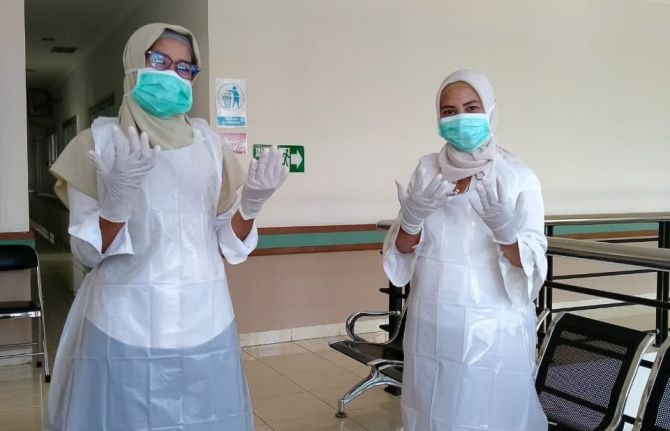
Feature Story
Paying tribute to care workers during an online Labour Day event
01 May 2020
01 May 2020 01 May 2020On 1 May 2020, the UNAIDS Executive Director Winnie Byanyima joined Oxfam Denmark to pay tribute to care workers during an online Labour Day event. Below are the transcripts of her video message.
Hello everyone!
It’s an honour to join you to celebrate 1 May—the international day of workers. In the time of COVID-19, it is our frontline workers in hospitals, community health centres, care facilities, supermarkets, taxis and delivery vans who are risking their lives for us.
Here in Geneva we clap for health workers and carers every evening at 9 p.m. to show our gratitude.
But this is not enough. We must value and fairly reward the work they do.
Women make up 70% of frontline health and care workers. Twenty-four million out of the 28.5 million nurses in the world are women, and they earn on average 28% less than their male counterparts. They are low paid and receive poor benefits. In developing countries, community health workers, mostly women, play a critical role in disease prevention, promoting healthy behaviours and linking community members to formal health centres. Community health workers are often women volunteers, getting no compensation from public health systems. What a gender injustice!
And guess what? The coronavirus is aggravating this injustice. It has been heartbreaking to watch TV images of nurses and doctors who died because they did not have personal protective equipment. We must protect our health workers and ask our governments to prioritize their safety.
Then there is unpaid care work, done mostly by poor women and girls in their households—raising children, feeding families, caring for the sick and the elderly and so on—work estimated to cost about US$ 11.5 trillion globally. The burden of unpaid care work denies women and girls education and economic opportunities, it undermines their well-being and other roles in society and, again, the coronavirus is making this worse. An African woman, who already walked on average 6 km a day to fetch water, now needs to fetch even more because of the virus.
So, as we fight this deadly virus, I say, let us tackle the old gender inequalities that are feeding on and aggravating it. Let us demand fair and equal pay for health and care workers, let us demand that they have the personal protective equipment they need. They are our heroes.
Let’s end exploitation of women by calling for the recognition, redistribution and reward of unpaid care work.
Workers of the world, let’s give value to what truly matters in life, and celebrate and justly reward all care workers.
Thank you!
Watch video message
Resources
Related
Documents
Maintaining and prioritizing HIV prevention services in the time of COVID-19
06 May 2020
In the time of coronavirus disease (COVID-19), sex and drug use will continue, regardless of physical distancing orders and policies. People who previously met in community gathering venues such as bars and clubs may now meet in different sites, ones that are “hidden” or less accessible. This, in turn, may hinder efforts to reach them with prevention interventions, such as condoms, lubricants, and needle–syringe programmes. With the widespread loss of livelihood and fewer employment opportunities, transactional sex, sex work and sexual exploitation may increase. Anxiety about the pandemic and personal vulnerability also may lead to some disruption in community cohesion, and to changes in the social and sexual norms that influence behaviour.
Documents
Condoms and lubricants in the time of COVID-19 — Sustaining supplies and people-centred approaches to meet the need in low- and middle-income countries — A short brief on actions, April 2020
06 May 2020
The aim of this brief is to ensure that the COVID-19 pandemic does not disrupt the supply of and demand generation for condoms. Sexual relations may be transformed in the new context of the pandemic, but they have not stopped. While access to male and female condoms has been critical in the global response to reduce HIV, sexually transmitted infections (STIs) and unintended pregnancies over the past three decades, these gains can be lost if condoms are not included in the essential commodities that are freely available to populations during the lockdown of countries. This brief for country condom programme managers and experts provides a summary of relevant actions to sustain supplies of male condoms, female condoms and lubricants, and to adjust approaches for condom promotion during the time of COVID-19.
Documents
Lessons from HIV prevention for preventing COVID-19 in low- and middle-income countries
06 May 2020
The COVID-19 pandemic is rapidly spreading across the world and including countries affected by other infectious disease epidemics, such as HIV, tuberculosis (TB) and malaria. Over the past three decades, the global HIV response has gained experience in developing effective prevention approaches. This brief seeks to provide a summary for decision makers and health programme implementers in low- and middle-income countries (LMICs) to help them make the best possible choices in preventing the virus responsible for COVID-19.

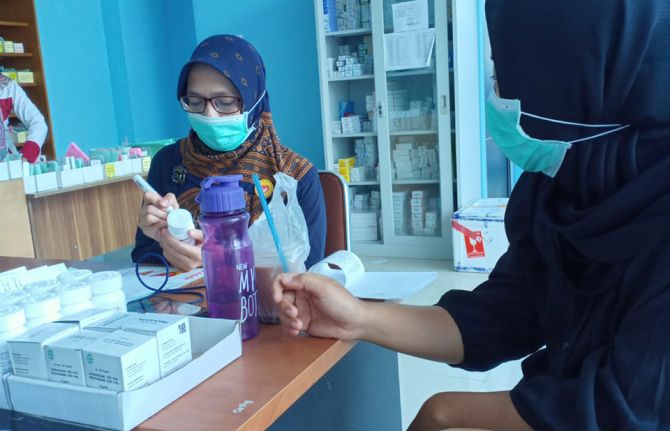
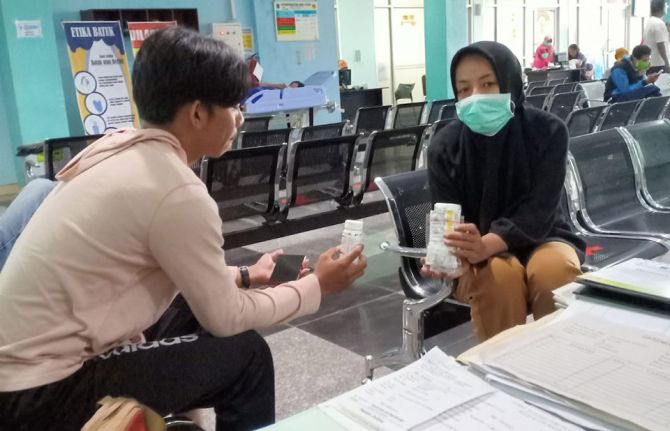
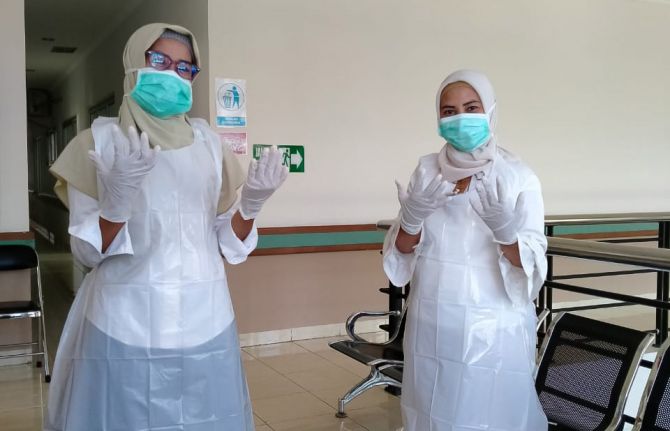
Feature Story
“The concern did not just come from the community, but also the health workers”
01 May 2020
01 May 2020 01 May 2020After the 2018 earthquake struck Lombok, in West Nusa Tenggara, Indonesia, the destruction it caused closed most health facilities. Among those affected were people living with HIV, who could no longer access their HIV treatment. Then, Yayasan InSET, a civil society organization in the province, stepped in, teaming up with health facilities in the area and taking on the role of delivering antiretroviral therapy to people in need. Today, the COVID-19 pandemic is threatening to do what the earthquake did to access to HIV treatment, and Yayasan InSET is ready to step in again.
Many people living with HIV in West Nusa Tenggara and in the rest of the country are acutely concerned about the possibility of disruption to HIV services and not being able to access antiretroviral therapy, owing to overburdened health facilities or the possibility of lockdowns. A recent rapid survey of 1000 people living with HIV conducted by the Positive Indonesia Network found that more than 41% were extremely anxious about COVID-19, with more than 36% worrying about their ability to obtain their HIV treatment.
“In West Nusa Tenggara, there are more than 500 people living with HIV on treatment who are worried about being unable to go to a clinic to access antiretroviral therapy,” said Himawan Afrian, the head of Yayasan InSET.
Yayasan InSET’s experience of working with hospitals and health centres after the earthquake has left it ready to help out in the COVID-19 outbreak. “Some health facilities actually contacted us a couple of weeks ago to ask for our help. The concern did not just come from the community, but also the health workers. Initially they asked us to raise awareness about COVID-19 prevention to our communities. Now we are working out the arrangements for us to take over the delivery of antiretroviral therapy should the situation worsen,” said Mr Afrian.
Having a close collaboration with the health services has been a big help for Yayasan InSET ensuring that people living with HIV are not left behind during the COVID-19 pandemic. Its direct advocacy has ensured that people living with HIV in the province receive a two-month supply of antiretroviral therapy. The organization has also successfully lobbied the authorities to move the HIV clinic away from the hospital, so people can swiftly pick up their medicines without entering the overcrowded clinics in the hospital, and has successfully advocated to the authorities in Mataram for the provision of food packages for sex workers and people living with HIV for six months.
During emergencies, whether pandemics or earthquakes, collaboration and local solutions are key to ensuring that there is as little disruption as possible to services for people living with HIV.
Resources
Region/country

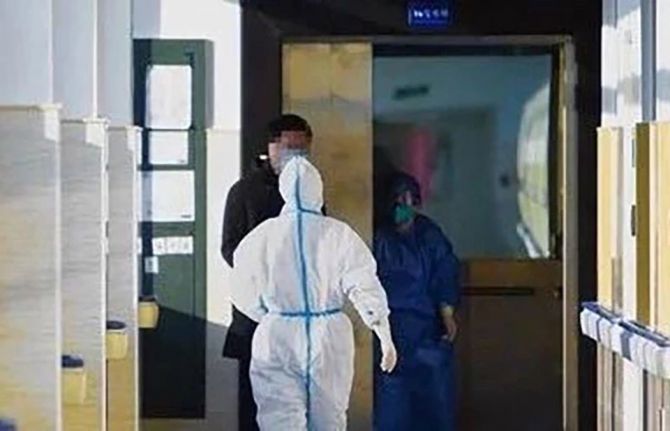
Feature Story
“I’ve saved lives on the frontline of the COVID-19 pandemic in China”
28 April 2020
28 April 2020 28 April 2020The winter of 2019/2020 in Wuhan, China, will remain with Xiao Yang for the rest of his life. During 60 days working in a makeshift hospital as an emergency nurse, he saw life and death, happiness and sorrow, tears and laughter.
Mr Xiao volunteered to go to Wuhan from his home town, Beijing, to save lives. “Saving life is the responsibility of every medical worker,” he said. This commitment is deeply rooted in his family—17 years ago, his father worked as a doctor on the frontline of the SARS epidemic.
Mr Xiao didn’t tell his boyfriend he was going to Wuhan until the last minute. “He didn’t want me to go, but he respected my decision,” he said.
On the night of their arrival in Wuhan, the volunteers were divided into two groups—intensive care and mild cases.
Mr Xiao was assigned to intensive care. For his protection, he was required to wear five gloves and two masks. However, most of the gloves were too small for him—wearing them for more than 20 minutes hurt. He also found it difficult to breathe. “It felt like someone was covering my mouth all the time,” he said.
Even worse for Mr Xiao is that he is asthmatic. If an asthma attack struck, he wouldn't have time to reach his medicine because of all the protective equipment he was wearing.
“All of us medical workers recorded final words for our families on our phones,” he said.
His boyfriend, Lin Feng, is a policeman. He too has become a lot busier because of the COVID-19 pandemic. When COVID-19 first broke out in Beijing, he was on duty for long hours, inspecting the freeways, streets and residential areas.
When the couple were far apart, instant messaging was the only way to communicate. Covered in snow after finishing his night shift, he received a text message from Mr Xiao reminding him to put on thicker clothes. His reply: “You take care of your patients. I’ll take care of you.”
Six days after his arrival in Wuhan, Mr Xiao realized that death could be near.
As he made his way around the ward, he saw a patient suffering from a drastic drop of blood oxygen level and shortness of breath. He rushed to intubate him—the quickest and most effective way to keep him alive. But he acted too forcefully, his protective suit tearing at his back—a colleague taped up the hole so he could continue to work.
After the patient was stabilized, Mr Xiao could hardly breathe and he felt sharp pains in his hands, ears and face—he had worn masks, gloves and his protective suit for too long. When the pain subsided, fear came over him. That leak could easily have seen him become infected with the new coronavirus. The leak also reminded him of the risks he was facing every day. “I can only pray I will be fine,” he said. “I was prepared for the worst when I decided to come here.”
There are many people from the lesbian, gay, bisexual, transgender and intersex community, like Mr Xiao and Mr Lin, who worked hard to contain the virus and save lives during the pandemic. In the Wuhan Lesbian, Gay, Bisexual and Transgender Center, 26 volunteers worked around the clock to deliver medicine to people living with HIV. UNAIDS was proud to support their efforts by connecting the centre with local health authorities to facilitate the delivery of medicine, helping with the delivery of medicine for Chinese people living with HIV overseas and supporting the establishment of a hotline providing counselling services for people living with HIV. As a result, the centre was able to deliver medicine to more than 2600 people, and the hotline reached about 5500 people.
“It was planned that I would stay for one week, but then it was extended to three weeks and then longer,” Mr Xiao said, choking back his tears.
He finally left in early April, when the COVID-19 pandemic subsided in the city. He said he will remember everything, but he doesn’t want to relive it. Nobody should.
Now safely back with his boyfriend in Beijing, he remembered the captain’s words on his flight to Wuhan, “The flight is from Beijing to Beijing, with a stopover in Wuhan. When you have won the battle, we will take you back home.”
Resources
Region/country

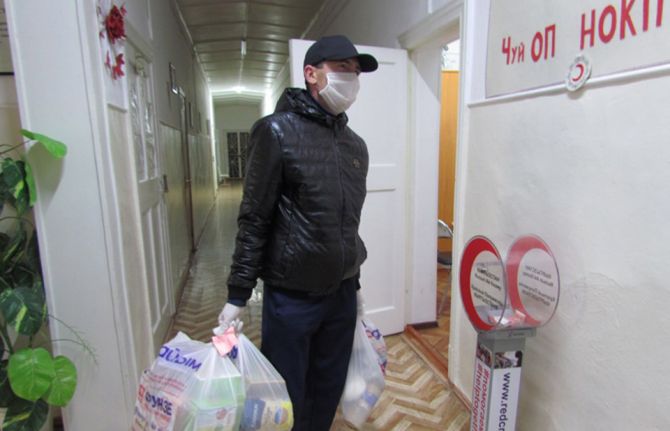
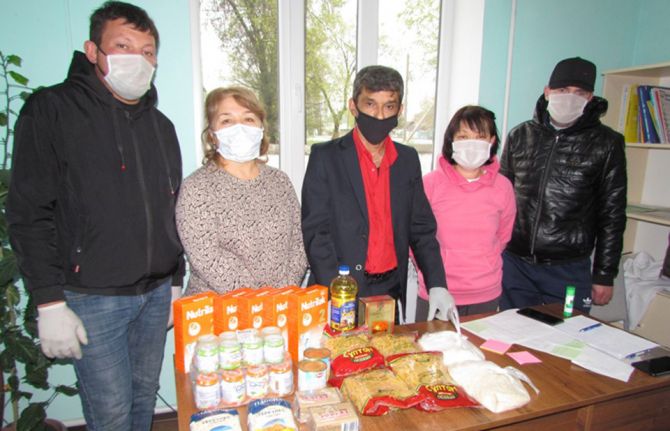
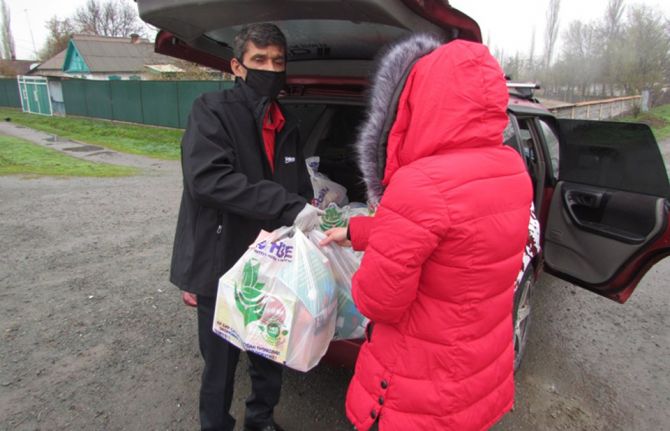
Feature Story
Helping people living with HIV with food supplies in Kyrgyzstan
27 April 2020
27 April 2020 27 April 2020Like most other countries, COVID-19 has not bypassed Kyrgyzstan—cases have been seen in the capital, Bishkek, and in almost all other major cities and provinces in the country.
In order to respond to the pandemic, a state of emergency was introduced on 25 March in Bishkek, Osh, Jalal-Abad and three districts, which restricts people to their home from 20:00 to 07:00 and allows people to leave their residence during the day only for a few specified reasons.
Like everyone else, people living with HIV in the country—UNAIDS estimates that there are 8500 people living with HIV in Kyrgyzstan—have faced a variety of challenges, including loss of earnings and difficulties in feeding their families.
In the small town of Karabalta, in the north of Kyrgyzstan, the HIV community organizations Believe in Yourself and the Country Network of Women Living with HIV work to promote the rights of people living with HIV. In the time of COVID-19, however, their services are even more in need.
Umid Shukurov, the Director of Believe in Yourself, explained that since the lockdown in Kyrgyzstan was announced, people living with HIV have got in contact with the organization in greater numbers. Access to food is a major concern for many. “Many people call us in despair, women cry and ask for help. Of course, we help in every way possible, but our resources are limited. When we, together with the Country Network of Women Living with HIV, compiled a list, we realized that 12 women living in our small town are in a distressed situation. Some of them have recently become mothers or are raising their children alone. Yesterday, we distributed food packages and some women could not believe that someone had reached them and brought them some food. The asked me, “Is it real that someone has heard us?”’’
Baktygul Shukurova, the Director of the Country Network of Women Living with HIV, knew that the network would face various problems after it was set up, but never thought that the problems would be of this magnitude. “Our task is to keep people on antiretroviral therapy. I have been through difficult situations in life myself and I know how difficult it can be when you simply have nothing to feed your children with. Only a person who has been through all this can understand the needs of communities. When you and your children have nothing to eat, you don’t care about the medication.”
Access to antiretroviral therapy is being ensured in the country by the provision of mulitimonth dispensing of medicines. During the COVID-19 pandemic, the national AIDS centre in Kyrgyzstan will be providing three-month supplies of antiretroviral therapy to all people living with HIV who are on treatment.
The UNAIDS Country Office in Kyrgyzstan, with the support of a Russian technical assistance programme, is organizing the delivery of food packages, which will supplement other social assistance available for people living with HIV, to 130 families of people living with HIV who have been the most affected by their loss of earnings. Apart from the food, the packages also contain colouring books, marker pens and watercolour sets for the children of people living with HIV, to help them get through the lockdown.
“We hope that this small help will go some way to enabling people living with HIV to remain on treatment,” said Meerim Sarybaeva, the UNAIDS Country Manager for Kyrgyzstan.
Our work
Region/country
Related
 Women, HIV, and war: a triple burden
Women, HIV, and war: a triple burden

12 September 2025
 Displacement and HIV: doubly vulnerable in Ukraine
Displacement and HIV: doubly vulnerable in Ukraine

11 August 2025

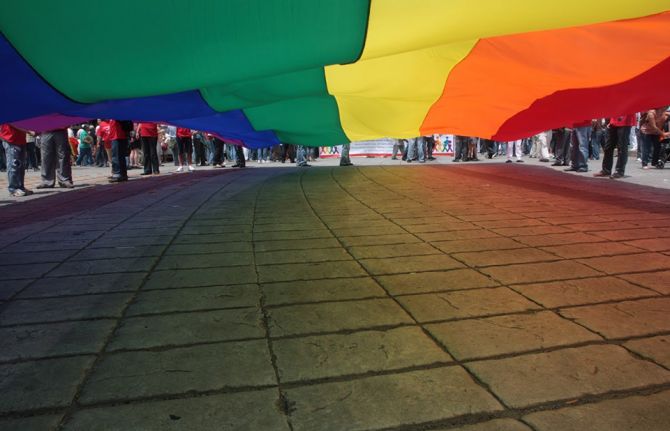
Press Release
UNAIDS and MPact are extremely concerned about reports that LGBTI people are being blamed and abused during the COVID-19 outbreak
27 April 2020 27 April 2020UNAIDS and MPact call on governments and partners to protect, support and respect the human rights of LGBTI people during the response to COVID-19
GENEVA, 27 April 2020—UNAIDS and MPact Global Action for Gay Men’s Health and Rights are extremely concerned that lesbian, gay, bisexual, transgender and intersex (LGBTI) people are being singled out, blamed, abused, incarcerated and stigmatized as vectors of disease during the COVID-19 pandemic. UNAIDS and MPact are also deeply troubled that this discriminatory action is compounding the challenges that LGBTI people already face in accessing their rights, including safe and quality health services.
“HIV has taught us that violence, bullying and discrimination only serve to further marginalize the people most in need,” said Winnie Byanyima, Executive Director of UNAIDS. “All people, regardless of their sexual orientation, gender identity or gender expression, are entitled to the right to health, safety and security, without exception. Respect and dignity are needed now more than ever before.”
In Belize, reports have detailed abuse by the police of a gay man who was arrested, humiliated and beaten for breaking a curfew imposed to curb the spread of the coronavirus. The 25-year-old was living with HIV and is believed to have died as a result of complications sustained from injuries inflicted by the police.
“We are receiving reports that government and religious leaders in some countries are making false claims and releasing misinformation about COVID-19 that has incited violence and discrimination against LGBTI people,” said George Ayala, Executive Director of MPact. “Organizations and homes are being raided, LGBTI people are being beaten, and there has been an increase in arrests and threatened deportation of LGBTI asylum seekers.”
In Uganda, 20 LGBTI people were recently arrested in a raid on a shelter, which police authorities claimed was due to their disobeying social distancing procedures. In the Philippines, three LGBTI people were among a group who were publicly humiliated as punishment for breaking the curfew. After segments of the incident went viral online, the police captain was forced to apologize for singling out the LGBTI group members and asking them to dance and kiss each other.
“There is also growing concern over privacy and confidentiality in the way governments are using Internet-based technologies and smartphones to monitor people’s movements during lockdowns or curfews,” Mr Ayala added. “Gay men and gender non-conforming people are often the first targets and among the most impacted by increased policing and surveillance efforts.”
For some LGBTI people, self-isolation and physical distancing can be particularly challenging, even dangerous. Many LGBTI people face violence and/or ill-treatment while sheltering in homes with unaccepting family members. LGBTI people may also suffer from intimate partner violence while staying at home, without the ability to report cases of abuse to the police owing to fear of repercussions. Isolation can also exacerbate pre-existing mental health challenges, common among LGBTI people, including loneliness, depression, anxiety and suicidal ideation.
The COVID-19 pandemic leaves many gay men and transgender women without adequate tools for taking control of their sexual health and rights. Gay men account for nearly 20% of all new HIV infections and are 22 times more likely to become infected with HIV than other men. Transgender women shoulder a risk of acquiring HIV that is 12 times higher than the general population.
Stay at home orders, especially when implemented without flexibilities, compound the difficulties these groups already experience in accessing antiretroviral therapy and HIV prevention and gender-affirming services, including hormone therapies. This is especially true for LGBTI people who are poor, unemployed, homeless or marginally housed.
UNAIDS and MPact are urging countries to:
- Denounce misinformation that scapegoats, slanders or otherwise blames LGBTI people for the spread of COVID-19.
- Stop raids on LGBTI-led organizations, shelters and spaces and desist from arresting people based on their sexual orientation, gender identity or gender expression.
- Ensure that all measures to protect public health are proportionate, evidence-informed and respect human rights.
- Prevent the use of state surveillance on LGBTI people’s personal communication technologies.
- Invest in the COVID-19 response, while safeguarding funds and HIV/sexual health programmes that are inclusive and sensitive to the needs of LGBTI people.
- Safeguard continued access to life-saving medical support, including harm reduction, condoms and lubricant, preexposure prophylaxis, antiretroviral therapy, hormone replacement therapies and mental health services for LGBTI people.
- Provide flexible service delivery options, from multimonth dispensing to community delivery and virtual consultation and support options.
- Consider designating community-led service organizations as essential service providers so that they can provide flexible, safe delivery of key services.
- Include LGBTI people in national social protection schemes, including income support.
- Increase access to appropriate emergency and safe housing for homeless and recently evicted LGBTI people.
- Engage LGBTI people in public health planning and messaging around COVID-19.
- Implement safety monitoring and hacking mitigation during virtual meetings.
Now more than ever, we must stand together to protect and promote the health and human rights of LGBTI people worldwide.
UNAIDS
The Joint United Nations Programme on HIV/AIDS (UNAIDS) leads and inspires the world to achieve its shared vision of zero new HIV infections, zero discrimination and zero AIDS-related deaths. UNAIDS unites the efforts of 11 UN organizations—UNHCR, UNICEF, WFP, UNDP, UNFPA, UNODC, UN Women, ILO, UNESCO, WHO and the World Bank—and works closely with global and national partners towards ending the AIDS epidemic by 2030 as part of the Sustainable Development Goals. Learn more at unaids.org and connect with us on Facebook, Twitter, Instagram and YouTube.
MPact
MPact Global Action for Gay Men’s Health and Rights was founded in 2006 by a group of activists concerned about HIV-related disparities as well as stigma discrimination, violence, and criminalization experienced by gay men and other men who have sex with men in all parts of the world. MPact is now an established international advocacy network dedicated to ensuring equitable access to HIV services to all gay men, while promoting health and human rights. Directly linked with nearly 150 community-led organizations across 62 countries and thousands of other advocates through its various social media platforms. MPact accomplishes its mission by: watchdogging governments, funders, and other decision makers; strengthening capacities of community-led organizations and healthcare providers; supporting the proliferation of networks led by gay men; conducting and commissioning research; and facilitating inter-regional information exchange.
Contact
UNAIDS GenevaSophie Barton-Knott
tel. +41 79 514 68 96
bartonknotts@unaids.org
MPact, Oakland, USA
Greg Tartaglione
gtartaglione@mpactglobal.org
Resources
Press centre
Download the printable version (PDF)

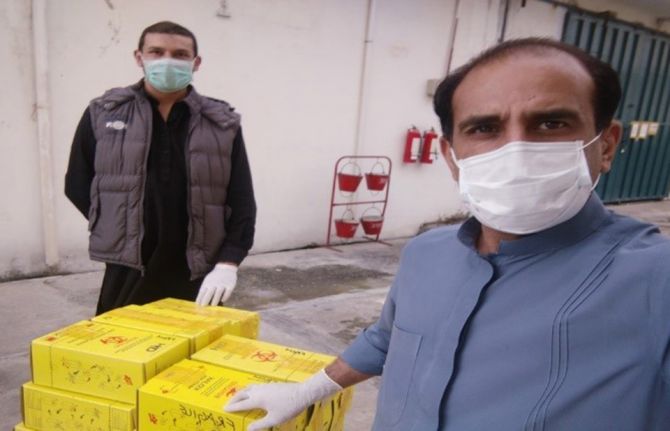
Feature Story
“We must ensure that HIV treatment adherence is not compromised”—keeping people in Pakistan on HIV treatment
29 April 2020
29 April 2020 29 April 2020It was a rainy night when Asghar Satti, the National Coordinator of the Pakistan Association of People Living with HIV (APLHIV), went home after spending a busy day at the office.
That day, he had received a call from a man in Karachi, Pakistan, who is living with HIV. He was worried that he was running low on his supply of antiretroviral therapy, with only nine days of treatment left. That call was one of many such calls that he had received since the beginning of the lockdown put in place after the first case of COVID-19 was identified in Pakistan in late February.
“We need to do something that really benefits the community, we must ensure that HIV treatment adherence is not compromised,” Mr Satti thought.
In order to do just that, the APLHIV set up its Emergency Response Cell (ERC) in March. The ERC is working to ensure that everyone on HIV treatment gets an adequate supply of antiretroviral therapy, often delivered to their door.
Developed by the APLHIV, together with UNAIDS and Pakistan’s National AIDS Control Programme Common Management Unit for AIDS, TB and Malaria, the ERC’s Costed Contingency Plan groups all people living with HIV who are on treatment into three groups: red (people with a supply of antiretroviral therapy for less than two weeks); yellow (people with a supply of antiretroviral therapy for a month); and green (people with a supply of antiretroviral therapy for more than a month). These groups are then used to prioritize who receives packages of antiretroviral therapy, provided by the National AIDS Control Programme, through APLHIV and the Provincial AIDS Control Programme. The National AIDS Control Programme, through its Procurement and Supply Management Unit, provides packages of antiretroviral therapy to APLHIV, which are delivered by APLHIV through courier services to the doorsteps of people living with HIV who are unable to reach treatment centres.
As well as ensuring HIV treatment, other services provided by APLHIV include education for people living with HIV and key populations on COVID-19—more than 70 000 short messages in the local language on how to prevent COVID-19 were sent during the first four weeks of the lockdown. APLHIV, in close collaboration with the Provincial AIDS Control Programme, is also monitoring the 45 centres nationwide that provide antiretroviral therapy, checking that they have sufficient stocks of treatment and that people living with HIV are being provided with services without stigma and discrimination.
With a grant from the Global Fund to Fight AIDS, Tuberculosis and Malaria, APLHIV has provided nutritional support to more than 3200 people living with HIV in need. “You can never imagine what this support means to me, when I don’t have a single penny to feed myself or my siblings. The help we reached is a blessing from God,” one of the recipients said.
APLHIV, which has more than 15 000 people living with HIV from across Pakistan in its network, has also linked around 4000 people living with HIV with one of the social protection programmes launched by the government to support people in need during the COVID-19 pandemic.
“APLHIV will continue operating the Emergency Response Cell until the COVID-19 pandemic ends in the country,” Mr Satti said.
“Working with the community with APLHIV is always fulfilling. The work almost always centres around finding local solutions to effectively respond to the evolving needs of the people, of the community. It is not always easy, but with constant dialogue, innovative ideas are born and then nurtured. This multimonth antiretroviral therapy dispensing and the simple use of different colours to depict level of antiretroviral therapy available, which people can easy understand, is another home-grown innovation we are proud of,” said Maria Elena Filio Borromeo, UNAIDS Country Director for Pakistan and Afghanistan.




